Learn How to Prepare for a Power Outage in One Simple Guide
How Do You Prepare For a Power Outage?
Any emergency can pose stress on the unprepared. By maintaining your calm you are better able to adapt to the situation. Preplanning is also critical for maintaining your calm. This is why you should have a plan in place for how you are going to deal with specific situations.
Preparing for a power outage poses a unique challenge. This is due to the fact that it can be extremely difficult to predict a power outage.
In the case of many storms and other natural disasters you often have some advanced warning.
Power outages can stem from a number of causes such as a severe storm, issues with a local power plant, brownouts due to overloading the grid, fallen trees and even car accidents.
With this many things that can cause your power to go out, it is important that you are properly prepared for a power outage.
By being prepared ahead of time you can turn what could be a potentially dangerous situation into a minor inconvenience.
This is why it is important that you know how to prepare for a power outage. I have gathered together a list of basic things that you should do as well as a simple printable chart that outlines the basic things you should do to prepare for a power failure.
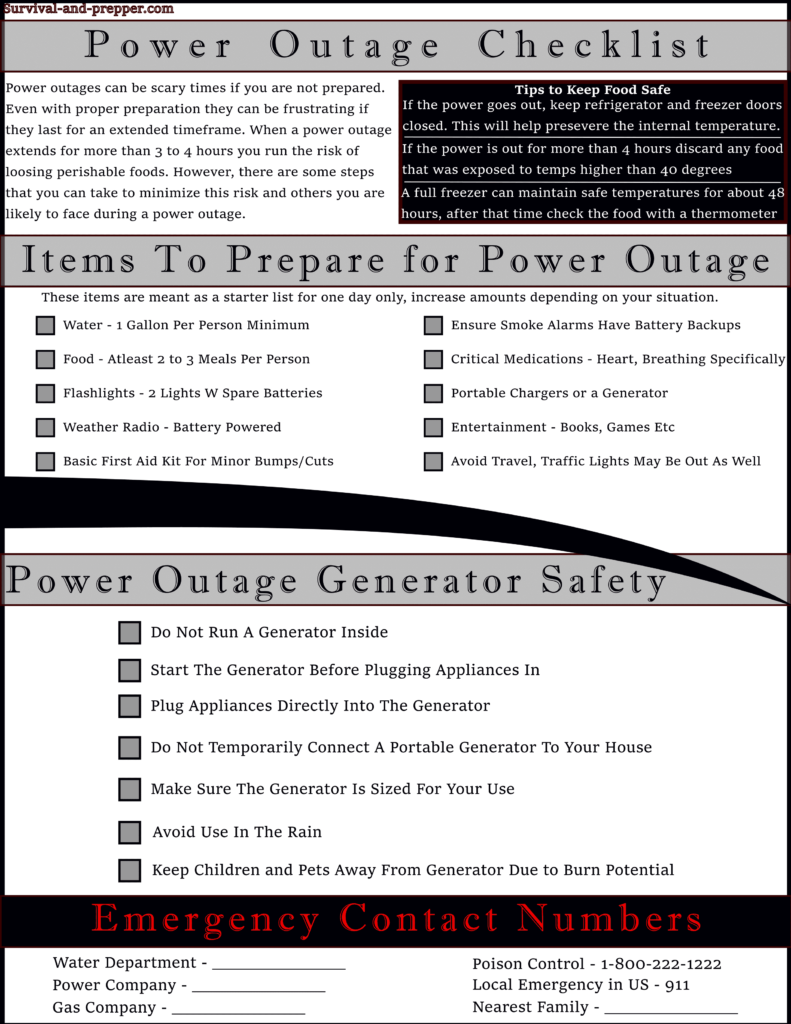
Basic Steps for Preparing to Do without Power
While for most people losing power is an inconvenience for others, who rely on special machines for their well being, it can be a matter of life and death.
For the average person it is best to have a plan in place to deal with a power outage in the following durations.
Four hours – Most outages will likely fall into this category and are relatively easy to handle as items stored in the refrigerator etc are not generally in danger if it is left closed. Most medical apparatus can last that long without power on their reserves, just verify this.
Twenty Four Hours – This is the minimum that you should start your preparations for. Most power outages will be over before this in all but the worst situations. This is the point that medical issues become critical for those that rely on it and the point when you will likely lose a lot of your refrigerated items.
More Than Three Days – Lasting more than three days during a power outage requires quite a bit of planning on your part. It is likely that if the power remains out for this amount of time that a major disaster has hit the area and supplies from stores may be inaccessible or scarce as well. This makes early preparation even more critical.
Let’s delve into the items you should consider and what you should add to your plans. Take the time to gather all of these items together and place them in a small tote. This can be put in an easy access place where they can be easily found when needed.
Plan for Medical Needs
The first thing to do when planning for a power outage is to consider what electronics are critical for your well being.
Do you need an oxygen system, cpap Machine, nebulizer or any other medical apparatus? Some of these come with battery powered options, but if not then you need to make sure you have some kind of external power capable of running these devices for an extended time if necessary.
Keep in mind that some medications require refrigeration and you will need to have a plan in place for that as well.
Some options for this could be a small battery reserve and an inverter. A portable generator or even a solar powered battery system as a backup.
Once you have addressed any absolute emergency needs then you move onto everything else.
Emergency Lighting – At least Two
Staying in the theme of safety, consider some emergency lighting. Battery powered lights are best for this. Make sure that you position these items in a location where you can easily access them.
It does no good to rely on that battery powered lantern you placed in your camping gear in the attic, if there is no light available to see how to find it.
Try and keep at a minimum 2 working lights and a spare set of batteries for both devices. This will help mitigate the chance of being left in the dark if one fails.
Even though I suggest two at a minimum here it would be better if you have at least 1 per person should they need to move around the residence alone.
Charged Cell Phone or Corded Home Phone
Communication with the outside world is essential both for safety reasons and peace of mind. In most cases your cell phone and old school land line phone systems may still work.
(Land Lines that are not cordless will often still function as they are powered independently of the power grid.)
While cell towers may lose power in an emergency it is becoming more common for them to have their own backup power sources allowing them to function for at least 72 hours with no power from the main grid.
By having your cell phone you can report the power outage and summon emergency services if necessary.
Water 1 Gallon Per Person Per Day
Many people will argue that water is not a concern during a power outage as the water should still flow through the pipes.
While that is true in most cases there are some things to keep in mind.
Since the electricity will be out you will be unable to pump water from a well if that is your primary source of water.
There is also a possibility that the machinery that sends water through the public lines will be out, or in an extreme weather situation that the primary water supply could become contaminated. This second scenario is actually not all that uncommon in major disasters.
How your stored food could be contaminated.
The CDC recommends storing at a minimum 1 gallon per person per day. It is also recommended that you have at least three days worth at any given time.
Food for Everyone – Remember the Power is Out
Despite the fact that the power is out people will need to eat. Obviously you can eat the foods you have around the house already.
However, keep in mind to preserve the food in your freezer and refrigerator. You want to minimize opening these to keep the cold air inside of them.
In most cases a refrigerator can maintain the food inside of it for four hours without power before it begins to spoil. A full freezer can usually last up to 48 hours.
The other thing to remember is a lot of your cooking methods will not be available. Your electric stove, skillet and microwaves will not work. Oftentimes gas stoves will not light unless lit manually. This will reduce your options when it comes to preparing your food.
With that in mind consider foods such as MRE’s or canned foods that are already prepared and can be consumed cold. While not the best tasting they will get the job done.
Their long shelf life makes them ideal candidates for an emergency kit.
A Basic First Aid Kit and Skill to Use It
Since most power outages are caused by major storms and are generally widespread in nature, it is likely that emergency responders will be stretched thin.
This is why you should have a basic first aid kit on hand. You should also know how to treat minor sprains, cuts and abrasions.
Consider adding some basic medications for things such as allergic reactions, pain and stomach issues.
These simple items will minimize the likelihood that you need to call first responders for an issue that you can handle on your own. With that being said try to minimize your travel as well.
The roadways are likely to be obstructed by storm debris and at a minimum traffic lights will be non functioning.
Emergency or Weather Radio
Even if you have a fully charged cell phone on hand, having an emergency radio is not a bad idea.
The weather service will be broadcasting not only the current weather conditions but also any public service announcements such as further incoming storms or places that you can seek shelter if needed.
These are inexpensive and come in powered, battery operated and even hand crank operated.
How to Prepare for a Power Outage in Winter
Preparing for a winter power outage can be even more important than any other time of the year. Many people assume that since their heating source is gas they will be fine if the power goes out.
While that may be true if they rely on a gas fireplace, it is not the case in a central heating system. While the heat from the system is provided by burning a gas of some sort, electricity is still needed to power the blower and distribute the heat throughout the residence.
Without heating it is important to have alternative heat sources available. Primarily in the form of hot hands and blankets. If you routinely face colder than normal weather and have concerns about power issues then you may want to consider a propane or kerosene heater designed specifically for use indoors.
Do not use an outdoor model inside. The exhausts from it can be fatal.
Plan to gather everyone in the home into one single room and hang a blanket across any exits. This will allow you to better heat that room while waiting for the power to come back on.
Another thing to keep in mind is that cold weather can cause batteries to drain faster, make sure to account for this and stockpile extras.
How to Prepare for a Power Outage in Summer
While very similar to a power outage during any other part of the year a summer outage can add some unique challenges.
One of the biggest concerns when the power is out in the summer is how hot it is. A battery powered fan could help you keep cool in these times.
Another option to remain cool is to move to a lower portion of the residence, such as the basement which generally remains at least a few degrees colder all year round.
You can reduce some of the heat build up by keeping the windows and doors closed as long as possible if you had been running the AC just before the power went out.
Another tip is to pull all of the blinds and curtains closed. This will help block the sun’s rays and lower the amount that items in its path heat up.
Due to the summer heat it is likely that perishable food will spoil faster. Keep that in mind and add a food thermometer to your gear. This will allow you to check the internal temperature of foods. If your refrigerated items are higher than 40 degrees you should probably discard those items.
How fast this food spoilage takes will depend on the time you are without power and how well your refrigerator maintained its cool. To increase this time, avoid opening the refrigerator if at all possible.
Keeping these tips in mind, adjust your plans accordingly.
How to Prepare for a Long Term Power Outage
Take your water storage to the next level by not only having at least two weeks worth of water stockpiled but by also knowing how to purify water if it becomes necessary.
In regards to food, once you begin considering a longer term outage or other disaster you should store two weeks worth of food per family member. These foods should be shelf stable with a long potential storage time. This will help to ensure they are ready when you need them. If it is an item you normally use then make sure to rotate your stocks so that they stay fresh.
This would likely be the time you also consider some alternative cooking methods such as a camp stove or outdoor grill. Other options include rocket stoves and solar ovens. Just do a bit of research and make sure you understand how to safely use whatever method you choose.
Another option you may want to consider both for short term and long term power outages is a portable generator. These are great if properly sized for your needs. You can also take steps to lower their noise output so that they don’t disturb you if you need to use them for an extended time.
Another consideration for long term outages is some form of entertainment.
What I mean here is books, games etc that will help you to pass the time. Coloring books seem to be fairly popular around our house.
Even something as simple as a child’s favorite toy can make the outage more bearable.
You Learned How to Prepare for a Power Outage
Remember it’s not just weather events that leave us without power.
Severe thunderstorms, broken power lines and extreme temperatures can cause electrical interruptions at any time.
No matter where you live, it is important that you know what to do if a power outage occurs.
By being prepared it happens you will not panic and it will simply be a minor inconvenience instead of a disaster.
Remember it is not if a power outage occurs, but when. Use what you have learned and prepare for a power outage now instead of realizing you should have once the power is already out.
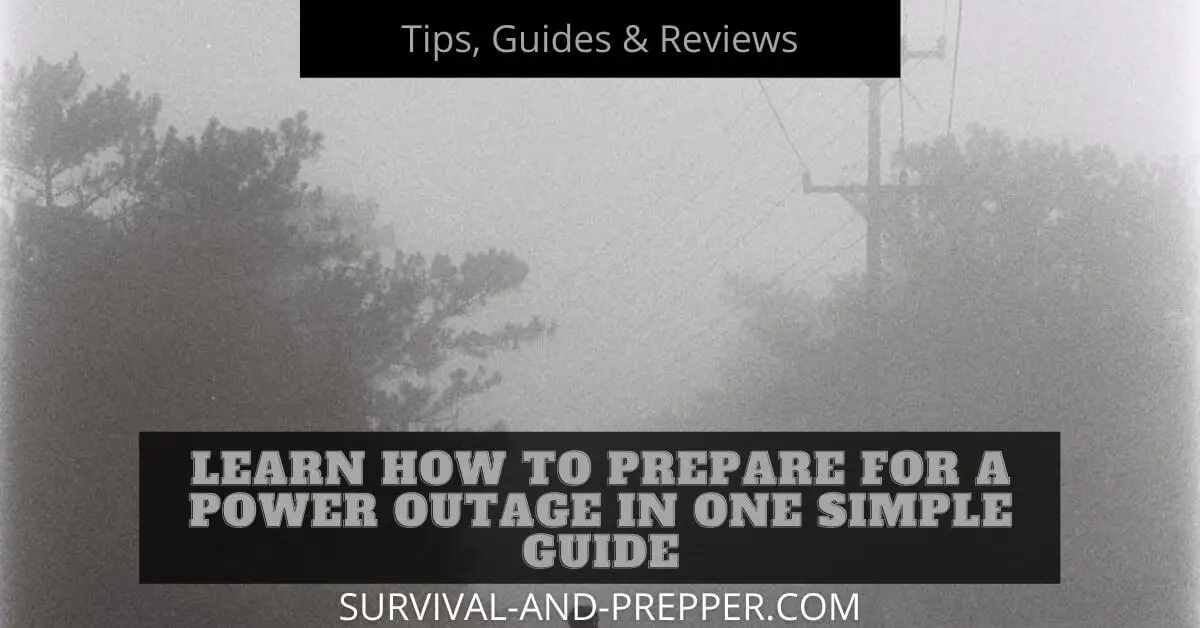
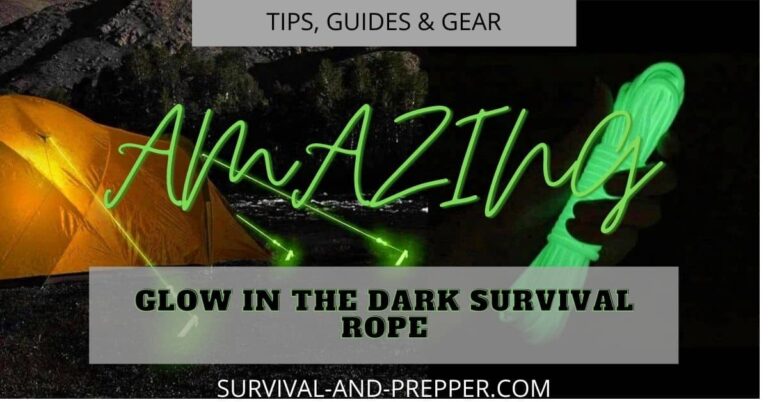

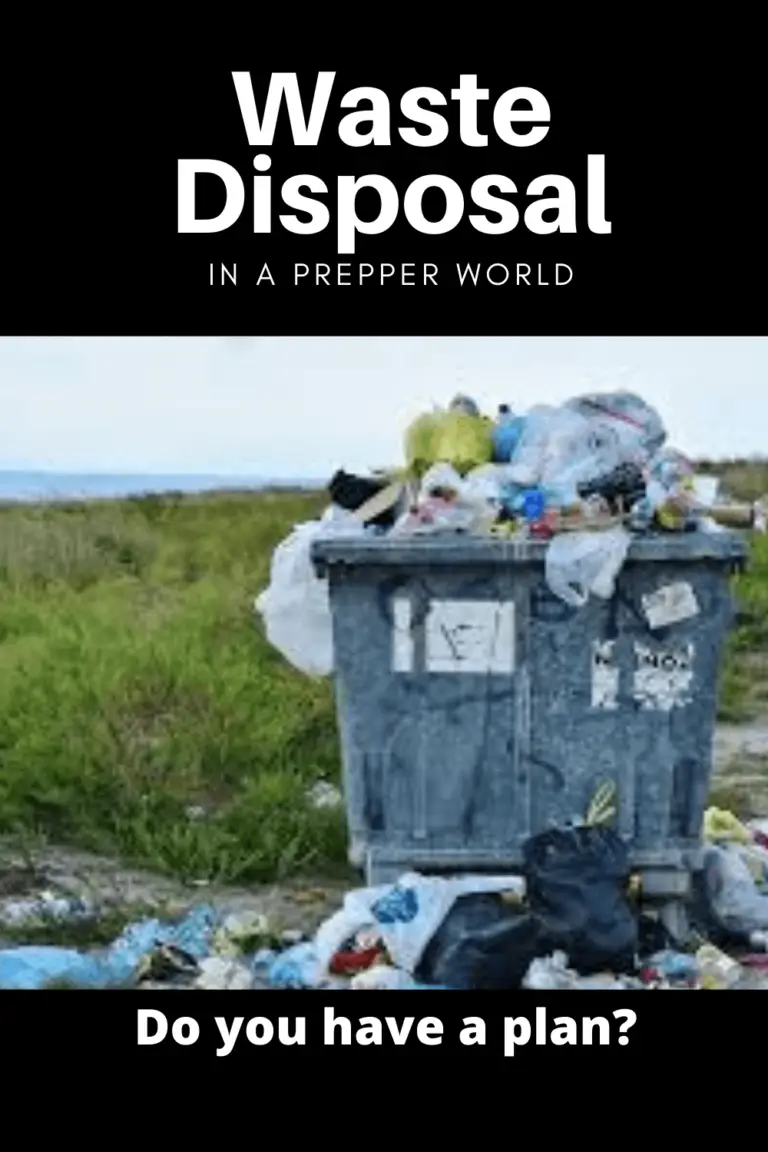
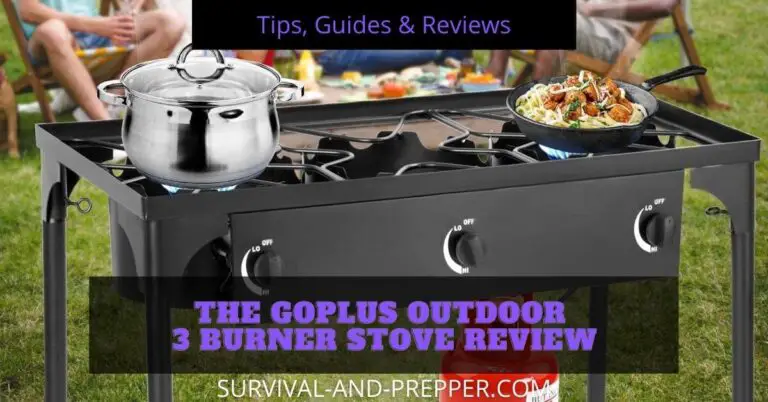
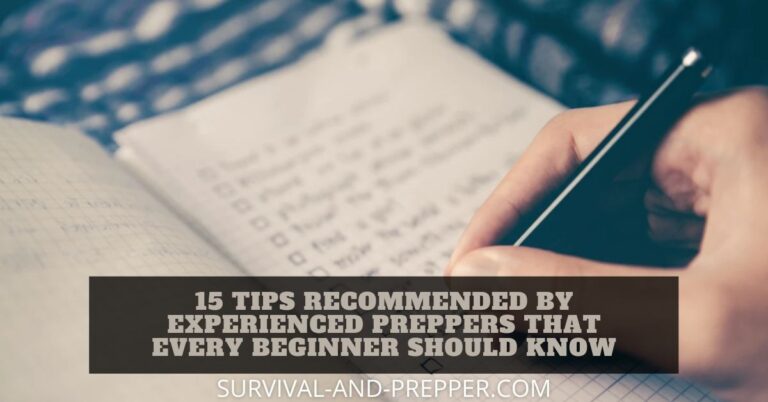

One Comment